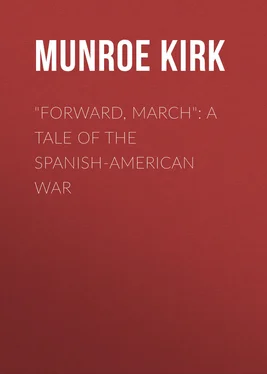Kirk Munroe - Forward, March - A Tale of the Spanish-American War
Здесь есть возможность читать онлайн «Kirk Munroe - Forward, March - A Tale of the Spanish-American War» — ознакомительный отрывок электронной книги совершенно бесплатно, а после прочтения отрывка купить полную версию. В некоторых случаях можно слушать аудио, скачать через торрент в формате fb2 и присутствует краткое содержание. Жанр: foreign_children, foreign_antique, foreign_prose, prose_military, на английском языке. Описание произведения, (предисловие) а так же отзывы посетителей доступны на портале библиотеки ЛибКат.
- Название:Forward, March: A Tale of the Spanish-American War
- Автор:
- Жанр:
- Год:неизвестен
- ISBN:нет данных
- Рейтинг книги:4 / 5. Голосов: 1
-
Избранное:Добавить в избранное
- Отзывы:
-
Ваша оценка:
- 80
- 1
- 2
- 3
- 4
- 5
Forward, March: A Tale of the Spanish-American War: краткое содержание, описание и аннотация
Предлагаем к чтению аннотацию, описание, краткое содержание или предисловие (зависит от того, что написал сам автор книги «Forward, March: A Tale of the Spanish-American War»). Если вы не нашли необходимую информацию о книге — напишите в комментариях, мы постараемся отыскать её.
Forward, March: A Tale of the Spanish-American War — читать онлайн ознакомительный отрывок
Ниже представлен текст книги, разбитый по страницам. Система сохранения места последней прочитанной страницы, позволяет с удобством читать онлайн бесплатно книгу «Forward, March: A Tale of the Spanish-American War», без необходимости каждый раз заново искать на чём Вы остановились. Поставьте закладку, и сможете в любой момент перейти на страницу, на которой закончили чтение.
Интервал:
Закладка:
The car doors were guarded, and no one was allowed to pass either in or out until the train was safely on the great boat that was to transfer it across the river. There the turbulent stream of humanity was permitted to burst forth, and in another moment a stalwart young soldier, who seemed to have broadened by inches since she last saw him, had flung his arms about Mrs. Norris's neck. Then he shook hands with his father and kissed both the girls, at which Spence Cuthbert blushed more furiously than ever.
A score of young fellows, all as grimy as Ridge, and all wearing the same uniform, watched this performance curiously, and now the latter began to present them.
"This is First Sergeant Higgins, mother, of our troop, and Mr. Gridley, and Mr. Pine of North Dakota. Dulce, allow me to introduce my tentmate, Mr. Van Kyp."
So he rattled off name after name, until the poor girls were thoroughly bewildered, and could not tell which belonged to whom, especially, as Dulce said, when they all looked exactly alike in those absurd hats, horrid flannel shirts, and ridiculous leggings.
Rollo Van Kyp was the only one of whose name and personality she felt certain, which is probably the reason she allowed that persuasive young trooper to escort her to the forward deck of the boat, where they remained until the river was almost crossed. After a while Ridge and Spence also strolled off together, ostensibly to find Dulce and Rollo, though they did not succeed until the farther shore was nearly reached, when all four came back together.
Rollo Van Kip had lost his hat, while Dulce held tightly in one daintily gloved hand a curious-looking package done up in newspaper. At the same time Spence Cuthbert blushed whenever something in the pocket of her gown gave forth a metallic jingle, and glanced furtively about to see if any one else had heard it.
A few days later Dulce appeared in a new riding-hat, which at once attracted the admiration and envy of all her girl friends. At the same time it was a very common affair, exactly like those worn by Uncle Sam's soldier boys, and on its front was rudely traced in lead pencil the words, "Troop K, Roosevelt's Rough Riders." In fact, it was one of the very hats that Dulce herself had recently designated as "absurd."
About the same time that Miss Norris appeared wearing a trooper's hat her friend Miss Cuthbert decorated the front of her riding-jacket with brass buttons. When Sergeant Norris sharply reprimanded Private Van Kyp for losing his hat, Rollo answered that he considered himself perfectly excusable for so doing, since in a breeze strong enough to blow the buttons off a sergeant's blouse a hat stood no show to remain on its owner's head, whereupon the other abruptly changed the subject.
In the mean time Mrs. Norris, who had recognized among the names of the young men presented to her those of some of the best-known families of the country, was surrounded by a group of Ridge's friends, who, as they all wore the same uniform that he did, she imagined must also be officers. So she delighted their hearts and rose high in their estimation by treating them with great cordiality, and calling them indiscriminately major, captain, or whatever military title happened on the end of her tongue. This she did until her husband appeared on the scene with Lieutenant-Colonel Roosevelt, whom he had known in Washington. The moment the fond mother discovered this gentleman to be her son's superior officer, she neglected every one else to ply him with questions.
"Did he think her boy would make a fine soldier? Was Ridge really an officer? If so, what was his rank, and why did he not wear a more distinctive uniform? Did General Roosevelt believe there would be any fighting, and if there was, would he not order Ridge to remain in the safest places?"
To all of these questions the Lieutenant-Colonel managed to return most satisfactory answers. He thought Ridge was in a fair way to make a most excellent soldier, seeing that he had already gained the rank of sergeant, which was very rapid promotion, considering the short time the young man had been in the service. As to his uniform, he now wore that especially designed for active campaigning, which Mrs. Norris must know was much less showy than one that would be donned for dress parades in time of peace. Yes, he fancied there might be a little fighting, in which case he meditated giving Ridge a place behind Sergeant Borrowe's dynamite gun, where he would be as safe as in any other position on the whole firing line.
Not only was Mrs. Norris greatly comforted by these kindly assurances, but she received further evidence that her boy was indeed an officer entitled to command and be obeyed when the troopers were ordered to re-enter the cars, for she heard him say:
"Come, boys, tumble in lively! Now, Rollo, get a move on."
Certainly an officer to whom even Captain Van Kyp yielded obedience must be of exalted rank.
There was some delay in starting the train, which was taken advantage of by Mr. Norris to disappear, only to return a few minutes later, followed by a porter bearing a great basket of fruit. This was given to Ridge for distribution among his friends. Spence Cuthbert also shyly handed him a box of choice candies, which she had carried all this time; but Dulce, seeing her brother thus well provided, gave her box to Rollo Van Kyp–a proceeding that filled the young millionaire with delight, and caused him to be furiously envied by every other man in the car.
Finally the heavy train began slowly to pull out, its occupants raised a mighty cheer, the trumpeters sounded their liveliest quickstep, and those left behind, waving their handkerchiefs and shouting words of farewell, felt their eyes fill with sudden tears. Until this moment the war had been merely a subject for careless discussion, a thing remote from them and only affecting far-away people. Now it was real and terrible. Their nearest and dearest was concerned in it. They had witnessed the going of those who might never return. From that moment it was their war.
On Thursday, June 2d, with their long, dusty journey ended, the last of the Rough Riders reached Tampa, hot and weary, but in good spirits, and eager to be sent at once to the front. They found 25,000 troops, cavalry, infantry, and artillery, most of them regulars, already encamped in the sandy pine barrens surrounding the little city, and took their place among them.
At Port Tampa, nine miles away, lay the fleet of transports provided to carry them to Cuba. Here they had lain for many days. Here the army had waited for weeks, sweltering in the pitiless heat, suffering the discomforts of a campaign without its stimulant of excitement, impatient of delay, and sick with repeated disappointments. The regulars were ready for service; the volunteers thought they were, but knew better a few weeks later. Time and again orders for embarkation were received, only to be revoked upon rumors of ghostly warships reported off some distant portion of the coast. Spain was playing her old game of mañana at the expense of the Americans, and inducing her powerful enemy to refrain from striking a blow by means of terrifying rumors skilfully circulated through the so-called "yellow journals" of the great American cities, which readily published any falsehood that provided a sensation. At length, however, the last bogie appeared to be laid, and one week after the Riders reached Tampa a rumor of an immediate departure, more definite than any that had preceded it, flashed through the great camp: "Everything is ready, and to-morrow we shall surely embark for Santiago."
CHAPTER VII
THE STORY OF HOBSON AND THE MERRIMAC
Only half the regiment was to go, and no horses could be taken, except a few belonging to officers. The capacity of the transports was limited, and though troops were packed into them like sardines into a can, there was only room for 15,000 men, together with a few horses, a pack-train of mules, four light batteries, and two of siege-guns. So, thousands of soldiers, heartbroken by disappointment, and very many things important to the success of a campaign, were to be left behind.
Читать дальшеИнтервал:
Закладка:
Похожие книги на «Forward, March: A Tale of the Spanish-American War»
Представляем Вашему вниманию похожие книги на «Forward, March: A Tale of the Spanish-American War» списком для выбора. Мы отобрали схожую по названию и смыслу литературу в надежде предоставить читателям больше вариантов отыскать новые, интересные, ещё непрочитанные произведения.
Обсуждение, отзывы о книге «Forward, March: A Tale of the Spanish-American War» и просто собственные мнения читателей. Оставьте ваши комментарии, напишите, что Вы думаете о произведении, его смысле или главных героях. Укажите что конкретно понравилось, а что нет, и почему Вы так считаете.












